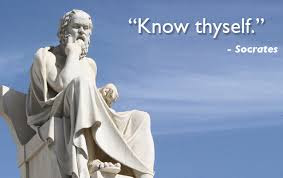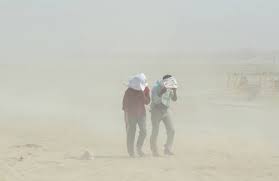
Look well into thyself; there is a source of strength which will always spring up if thou wilt always look there.”
-Marcus Aurelius, Roman Emperor (A. D. 161-180)
-Marcus Aurelius, Roman Emperor (A. D. 161-180)
K is for "Know thyself":
Since the beginning of humanity, great philosophers of the world had been delving deep into the intricacies of our elusive selves.
The ancient Greek aphorism ‘KNOW THYSELF’ is one of the Delphic maxims inscribed in the forecourt of the Temple of Apollo at Delphi. The curious believers since then always pondered over it.
Later on, Socrates expounded it in many of his discourses. For him “The unexamined life is not worth living.” Socrates even maintained, “The only true wisdom is in knowing you know nothing."
His disciple Plato took it up extensively in his scholarly creations. He was the forerunner of Western philosophy and science. He propounded, “Essence of knowledge is self-knowledge.”
The quest for knowing the truth and establishing identity has been going on since antiquity. Great philosophers and thinkers of the world have all tried to comprehend the mysteries of the self. They came up with numerous insights, which inspired humankind to carry on with this endless search.
The understanding of self-awareness, in fact, opens the doors for realizing one’s potential for a productive life. In our short odyssey on the earth, frequent episodes of inner dialogue happen. They serve as revelations. A conscious individual always endeavors to extricate self from the limiting absurdities around.
“The knowledge of self will preserve your from vanity.”
Miguel de Cervantes
However, in the rat race of modern life, is it possible to listen to the internal voiceless flow? It may appear paradoxical yet in spite of this fast-paced existence, a desire to make life exceptional and more dynamic has to be developed.
....
Here is an attempt at loud thinking based on impressions gleaned over the years:
One thing, which helps in discovering ourselves, is our interactions with others. Reactions good or bad in specific or everyday situations of people close to us or our acquaintances or our friends or others throw useful learning lessons. Self-knowledge acquired thus help us in adapting our self-image vis a vis others.
In a way, the behavior of others educates us about those whose association leads to pessimism, brooding and pulling us down. It signals us to be friends with those who perk up our confidence and shun the naysayers. Developing links with people who raise us and enhance the positive aspect of life should be assiduously pursued. Being aware of this option becomes an inspiration for better management of our lives.
Self-awareness is akin to mindfulness, exhorting us to devote a single-minded approach to our life tasks. As Swami Vivekananda succinctly puts it,
“Take up one idea. Make that one idea your life - think of it, dream of it, live on that idea. Let the brain, muscles, nerves, every part of your body, be full of that idea, and just leave every other idea alone. This is the way to success.”
Writings of great philosophers especially Socrates' polemics with his listeners and Plato’s dialogues are great influencers in clearing doubts and bigoted perceptions.
Looking inside for analyzing our fears and anxieties objectively is conducive to finding solutions. A free and relaxed mind expands the creative horizon.
A serious evaluation of our experiences can help in making better decisions for self-improvement.
Self-knowledge also means being true to one’s core values. Honesty truthfulness and probity are our treasures and under no circumstances should ever be compromised.
Our internal invisible monologue says a lot about our thinking process, which defines our personalities. All its warnings and appraisals nudge and activate our receptiveness to change and to act courageously.
Acquiring self-knowledge is an exercise, which continues throughout life. It is rightly pointed out that we are always in the act of becoming.
Friends welcome here as always! Images, courtesy Google.
Sharing with:






